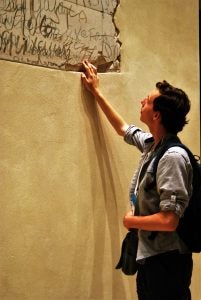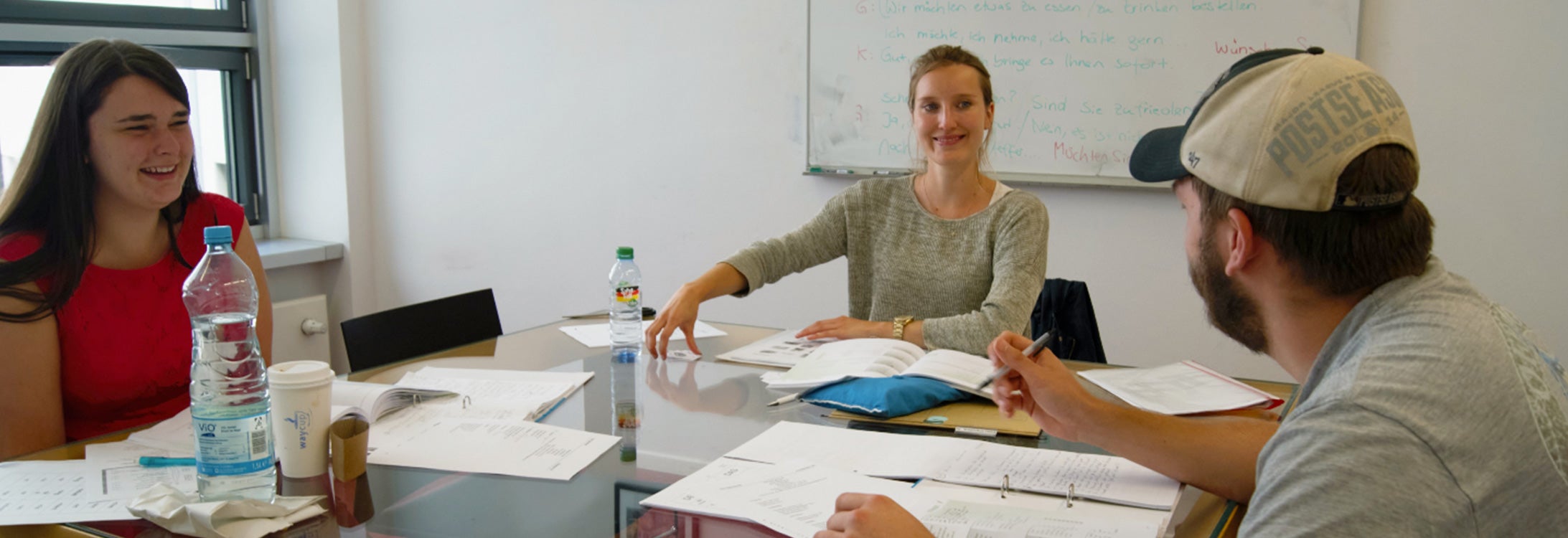Academics
German Language Courses (GERM 1001-GERM 3330)
Language classes are offered at any level – so whether you are beginning with “Hallo” or aiming for more advanced levels of proficiency, there is a class for you. German language courses are taught by the language school Inlingua in Berlin for four hours a day (typically in the mornings). You will be placed into the appropriate level, based on your previous coursework and a placement exam. You will earn up to 6 credits (2 semesters worth of German courses) in four weeks of language study. The immersion in German language and culture, of course, will enrich your linguistic and cultural experience exponentially.
 The language institute Inlingua is located near Wittenbergplatz, right at the heart of Berlin, no more than a short walk or bicycle ride away from tourist attractions like the KaDeWe, the Gedächtniskirche (Memorial Church), the Europacenter, the Tiergarten, the Berlin Zoo, and many other iconic sites. Shopping and restaurants are equally close. The language institute is on the seventh floor of a modern of building, with breathtaking views of Berlin.
The language institute Inlingua is located near Wittenbergplatz, right at the heart of Berlin, no more than a short walk or bicycle ride away from tourist attractions like the KaDeWe, the Gedächtniskirche (Memorial Church), the Europacenter, the Tiergarten, the Berlin Zoo, and many other iconic sites. Shopping and restaurants are equally close. The language institute is on the seventh floor of a modern of building, with breathtaking views of Berlin.
Inlingua Berlin is recognized by the Berlin Senate, the federal Ministry for Employment and the Federal Ministry for Migration and Refugees. The classes have a maximum number of 12 students and teachers use the communicative approach to immerse learners in German from day one on. At the end of the four-week course, participants will receive a graded certificate, which will transfer in as graded ECU language credits.
The language institute Inlingua is located near Gendarmenmarkt, the beautiful and famous square right at the heart of Berlin, no more than a short walk or bicycle ride away from tourist attractions like the Brandenburg Gate, Checkpoint Charlie, the Tiergarten, Reichstag, and many other iconic sites. Shopping and restaurants are equally close. The language institute is on the second floor of a modern of building. A café on the ground floor is open all year round from 7.00 am till 7.30 pm. Free W-Lan is available on all their premises, with free internet access in the internet room.
Taking German in Berlin is a great option for those of you contemplating the addition of a German major or minor, but with little flexibility in your primary major curriculum. German is also a great complement to other programs, such as business, history, communications, engineering, music, anthropology, or education, to name a few.
GLST 2600: The Holocaust and Its Remembrance

In GLST 2600: The Holocaust and Its Remembrance (3 credits), we will learn about the history of the Holocaust through lectures (2-3 times a week) and visit sites such as the Reichstag, Sachsenhausen concentration camp, the House of the Wannsee Conference or the Topography of Terror exhibition in Berlin. There we usually have guided tours or more extensive seminars by expert docents on particular topics pertaining to the Third Reich, such as resistance, propaganda, victim and perpetrator perspectives etc.
In addition, we will engage with various sites of remembrance such as the Memorial to the Sinti and Roma victims of National Socialism, the Jewish Museum, or the Memorial to the Murdered Jews of Europe. Our goal is to get a sense of how these different sites of remembrance approach the difficult task to “remember” or commemorate something our generation did not personally experience. How have the memory approaches evolved over time? Which do we find most engaging and why?
We will also be able to explore Jewish life in Berlin before and after its destruction and follow less visible traces such as the stumbling stones turning up all over Berlin. Our goal is to gain a deeper, more invested understanding of the events that unfolded in the mid-twentieth century and explore its relevance for us today. We will also get a glimpse of the memory culture in Germany today: How do Germans deal with their troubled past?
GERM 3700: Orte der Erinenrung

Advanced students in the German program may choose to take GERM 3700: Orte der Erinnerung (3 credits). Through visits to a variety of historical sites, ranging from the time of Prussian rule all the way through Germany’s separation and reunification, we read the country’s capital as a memory text. We analyze how these architectural markers have been woven into the national memory discourse throughout the 18th-20th centuries and how some of those narratives have changed in different political and social environments. We read German articles about sites of remembrance in Berlin and visit places associated with the Holocaust, but also with other important events and historical figures, such as Sanssouci Castle, the Berlin Wall, the GDR Museum, the Stasi prison at Hohenschönhausen etc. We even embark on all-day excursions to the Potsdam castles (seat of the Prussian king and arguably the cradle of modern Germany) and Dresden (a city where 18th splendor mixes with 20th palimpsests of WWII, the GDR, and post-unification Germany) on the weekend. At the end, you get to lead your own guided tour of a site of remembrance in German.
